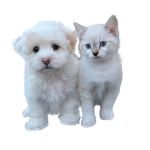The kidney is a filtering organ. Thanks to it, waste substances are eliminated.
What is the function of the kidneys?
The kidneys clean, filter harmful elements, maintain the feline blood pressure in physiological limits, participate in the process of production of red blood cells, and therefore are vital in the welfare of our pets.
Renal Insufficiency
It is a chronic disease common in older cats, but it can also occur in young cats due to kidney tumors, kidney stones, blows or falls, bacterial infections in the kidneys or other causes such as birth defects in the development of the kidneys.
It can be controlled but not cured.
Symptoms of kidney problems in cats
The symptoms can be several.
- Anorexia: The cat does not eat or eats absolutely capriciously without consuming much.
The cat will have a preference for high-protein treats. - Increased water consumption: In some cats, kidney failure means increased water consumption.
They have a greater need to drink and, consequently, urinate much more. They drink a lot and eat little. - Edema: water retention
- Weight loss: Since they drink more water and eat less, they will begin to lose weight rapidly.
- Loss of hygiene habits
- Vomiting, diarrhea
- Depressed state
- Weakness
- Rough, dull coat
- Bad breath
Prevention
It is recommended to avoid access to plants such as lilies, foods such as garlic or grapes that are toxic to the kidney, as well as being near pesticides, and to avoid foods with a high phosphorus content.
Therapies
Foods geared toward kidney health are in general:
- Low protein
- Low phosphorus content
- Low salt content
- Higher content of Omega-3 fatty acids, potassium and vitamins B and C.
Commercial cat foods are often high in phosphorus and protein of low nutritional value.


